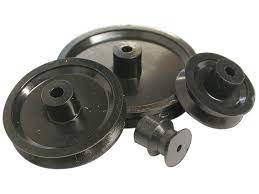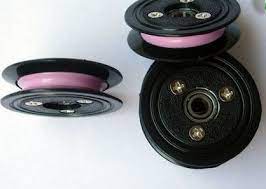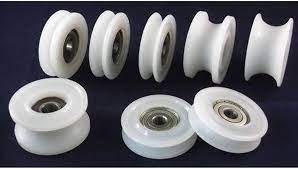Product Description
Plastic pulley:
| Type: | RS-RPP150/40,RS-RPP150/60,RS-RPP180/60 |
| Material: | Nylon |
| Color: | Black, and we could produce the color as per request |
CHINAMFG Shutter Component Co., Ltd.specialized in plastic injection,hardware and aluminum products for the rolling shutter accessories like handle crank,side frame,end cap,drive wheel,etc.
Goods in nice quality and competitive price.
Company website: rollmax
Company address:No.18 Bangang Rd,Luotuo Industry Park,HangZhou.
/* January 22, 2571 19:08:37 */!function(){function s(e,r){var a,o={};try{e&&e.split(“,”).forEach(function(e,t){e&&(a=e.match(/(.*?):(.*)$/))&&1
| Kind: | Pulley |
|---|---|
| Structure: | Horizontal |
| Open Type: | Manual |
| Style: | Modern |
| Usage: | Roller Shutter |
| Material: | Plastic |
| Samples: |
US$ 2/Piece
1 Piece(Min.Order) | |
|---|
| Customization: |
Available
| Customized Request |
|---|
How do plastic pulleys impact the performance of garage door systems?
Plastic pulleys have a significant impact on the performance of garage door systems. Here’s a detailed explanation:
1. Smooth and Quiet Operation:
Plastic pulleys are designed to provide smooth and quiet operation in garage door systems. The use of plastic materials, such as high-density polymer or nylon, in the pulleys reduces friction and minimizes noise during the opening and closing of the garage door. The smooth movement facilitated by plastic pulleys enhances the overall user experience and ensures a quieter operation, especially compared to metal pulleys that can create more noise and require more lubrication.
2. Durability and Longevity:
Plastic pulleys offer excellent durability and longevity in garage door systems. The plastic materials used in the construction of these pulleys are resistant to corrosion, rust, and moisture, making them suitable for outdoor applications. Plastic pulleys are less susceptible to wear and tear, which extends their lifespan and reduces the frequency of replacements. Their durability ensures consistent performance and reliable operation of the garage door system over an extended period.
3. Reduced Maintenance:
Due to their durable nature and self-lubricating properties, plastic pulleys require less maintenance compared to metal pulleys. The plastic materials used in the pulleys do not require frequent lubrication, unlike metal pulleys that may require regular oiling or greasing. This reduces the maintenance efforts and costs associated with keeping the garage door system in optimal condition. Additionally, plastic pulleys are less prone to accumulation of dirt or debris, further minimizing the need for cleaning or debris removal.
4. Improved Safety:
Plastic pulleys contribute to improved safety in garage door systems. The use of plastic materials reduces the risk of injury or damage in case of accidental contact with the pulleys while the door is in motion. Unlike metal pulleys, plastic pulleys have a smooth and lightweight construction, reducing the potential for accidents or injuries. Additionally, the reduced friction and smoother movement provided by plastic pulleys decrease the strain on the garage door opener and other components, enhancing the overall safety and reliability of the system.
5. Cost-Effectiveness:
Plastic pulleys offer a cost-effective solution for garage door systems. They are generally less expensive than metal pulleys, making them a budget-friendly option for homeowners and businesses. Moreover, the durability and longevity of plastic pulleys result in reduced maintenance and replacement costs over time. The cost-effectiveness of plastic pulleys makes them a popular choice in residential and commercial garage door systems.
6. Compatibility:
Plastic pulleys are designed to be compatible with various garage door systems. They are available in different sizes and configurations to match the specific requirements of different door types and mechanisms. Plastic pulleys can be easily installed or replaced in existing garage door systems, providing a hassle-free solution for homeowners and professionals.
7. Energy Efficiency:
Plastic pulleys contribute to energy efficiency in garage door systems. The smooth and low-friction operation of plastic pulleys reduces the amount of energy required to open and close the garage door. This energy efficiency can result in lower electricity consumption and reduced costs over time, especially in cases where the garage door is frequently used.
Overall, plastic pulleys have a positive impact on the performance of garage door systems. They provide smooth and quiet operation, durability, reduced maintenance, improved safety, cost-effectiveness, compatibility, and energy efficiency. These benefits make plastic pulleys a preferred choice for homeowners and professionals seeking reliable and efficient garage door operation.
How are plastic pulleys utilized in industrial machinery and conveyor systems?
Plastic pulleys play a crucial role in industrial machinery and conveyor systems. Here’s a detailed explanation of how plastic pulleys are utilized in these applications:
1. Belt and Chain Drives:
In industrial machinery and conveyor systems, plastic pulleys are extensively used in belt and chain drives. These pulleys serve as the guiding and tensioning components for belts and chains, facilitating the transfer of power and motion between different parts of the machinery or conveyor system. Plastic pulleys ensure proper alignment, tension, and engagement of the belts or chains, enabling smooth and efficient operation.
2. Material Selection:
Plastic pulleys are chosen for their specific material properties that make them suitable for industrial applications. Different types of plastics, such as nylon, polyethylene, or acetal (POM), are selected based on factors like strength, wear resistance, chemical resistance, and temperature tolerance. The material selection ensures that plastic pulleys can withstand the demanding operating conditions, loads, and forces encountered in industrial machinery and conveyor systems.
3. Wear and Friction Reduction:
Plastic pulleys are designed to minimize wear and friction in industrial machinery and conveyor systems. They often incorporate additives or fillers, such as reinforcing fibers or lubricants, to enhance their wear resistance and reduce friction. These features help prolong the lifespan of the pulleys and the belts or chains, improving the overall reliability and efficiency of the system. Plastic pulleys with low friction properties also contribute to energy savings and smoother operation.
4. Noise and Vibration Damping:
Plastic pulleys offer inherent noise and vibration damping properties, making them an ideal choice for industrial machinery and conveyor systems. The damping effect of plastic materials helps absorb vibrations generated during operation, reducing noise levels and minimizing the transmission of vibrations to other parts of the system. This results in quieter operation and improved working conditions for operators. Plastic pulleys contribute to overall system performance and enhance the user experience in industrial settings.
5. Corrosion Resistance:
Industrial machinery and conveyor systems may be exposed to harsh environments that involve moisture, chemicals, or corrosive substances. Plastic pulleys are resistant to corrosion, making them well-suited for such conditions. Unlike metal pulleys that can rust or corrode, plastic pulleys remain unaffected, ensuring reliable performance and reducing the need for frequent maintenance or replacements. The corrosion resistance of plastic pulleys contributes to the longevity and durability of industrial machinery and conveyor systems.
6. Design Flexibility:
Plastic pulleys offer design flexibility, allowing for customization and optimization in industrial machinery and conveyor systems. They can be molded into various shapes, sizes, and configurations to meet specific application requirements. Plastic pulleys can incorporate features such as flanges, grooves, or mounting options directly into the design, ensuring proper belt or chain engagement, alignment, and tension. This design flexibility allows for efficient integration and enhances the performance and reliability of industrial machinery and conveyor systems.
7. Cost-Effectiveness:
Plastic pulleys offer cost-effectiveness in industrial machinery and conveyor systems. They are generally more affordable compared to metal pulleys, resulting in lower production costs. Additionally, the lightweight nature of plastic pulleys contributes to reduced energy consumption and lower shipping costs. Plastic pulleys provide a balance between performance, durability, and affordability, making them a cost-effective choice for industrial applications that require multiple pulleys in machinery or conveyor systems.
In summary, plastic pulleys are extensively utilized in industrial machinery and conveyor systems for belt and chain drives. They are chosen for their specific material properties, including wear resistance, low friction, corrosion resistance, and design flexibility. Plastic pulleys contribute to smooth operation, reduced wear and friction, noise and vibration damping, corrosion resistance, design optimization, and cost-effectiveness in industrial applications.
What is a plastic pulley, and how does it compare to other types of pulleys?
A plastic pulley is a type of pulley made primarily from plastic materials, such as nylon, polyethylene, or polycarbonate. It is designed to perform similar functions as other types of pulleys but offers distinct advantages and considerations. Here’s a detailed comparison of plastic pulleys with other types of pulleys:
1. Material:
Plastic pulleys are specifically engineered to be lightweight and durable. They are resistant to corrosion, moisture, and many chemicals, making them suitable for various environments. In contrast, other types of pulleys, such as metal pulleys, may be heavier and prone to rust or corrosion without proper protection.
2. Cost:
Plastic pulleys tend to be more cost-effective compared to metal pulleys or pulleys made from other materials like ceramic or glass. The manufacturing process for plastic pulleys is generally less expensive, resulting in lower production costs and, consequently, lower prices for consumers.
3. Noise and Vibration:
Plastic pulleys often provide quieter operation compared to metal pulleys. The inherent damping properties of plastic materials help reduce noise and vibration during pulley rotation. This makes plastic pulleys suitable for applications where noise reduction is desired, such as in household appliances or office equipment.
4. Friction and Wear:
Plastic pulleys generally have lower friction coefficients compared to metal pulleys. This can result in reduced wear and tear on the pulley itself and the associated components, such as belts or ropes. However, it’s important to note that the selection of the appropriate plastic material and design considerations are crucial to ensure sufficient strength and wear resistance for the intended application.
5. Load-Bearing Capacity:
While plastic pulleys can handle moderate loads, they may have lower load-bearing capacities compared to metal pulleys. Metal pulleys, especially those made from robust materials like steel or cast iron, are typically stronger and capable of withstanding higher loads. Therefore, in heavy-duty applications or situations where significant forces are involved, metal pulleys may be preferred.
6. Temperature Resistance:
Plastic pulleys have varying temperature resistance depending on the specific material used. Some plastics can withstand a wide temperature range, while others may have limitations. For example, nylon can handle higher temperatures compared to polyethylene. In contrast, metal pulleys generally have higher temperature resistance, making them suitable for high-temperature environments.
7. Application Specificity:
The choice between plastic pulleys and other types of pulleys often depends on the specific application requirements. Plastic pulleys are commonly used in light to moderate load applications, such as in small appliances, office equipment, or recreational devices. Metal pulleys, on the other hand, are often preferred in heavy-duty applications, industrial machinery, or situations where high strength and durability are paramount.
8. Customization:
Plastic pulleys offer flexibility in terms of design and customization options. They can be easily molded into various shapes and sizes, allowing for specific features or geometries to be incorporated. This makes plastic pulleys suitable for applications where precise customization is required. Metal pulleys may require more extensive machining or manufacturing processes for customization.
In conclusion, plastic pulleys offer unique advantages such as lightweight construction, corrosion resistance, cost-effectiveness, noise reduction, and design flexibility. However, they may have limitations in terms of load-bearing capacity and temperature resistance compared to metal pulleys. The choice between plastic pulleys and other types of pulleys depends on factors such as application requirements, load conditions, environmental considerations, and budget constraints.
editor by CX
2024-04-30




